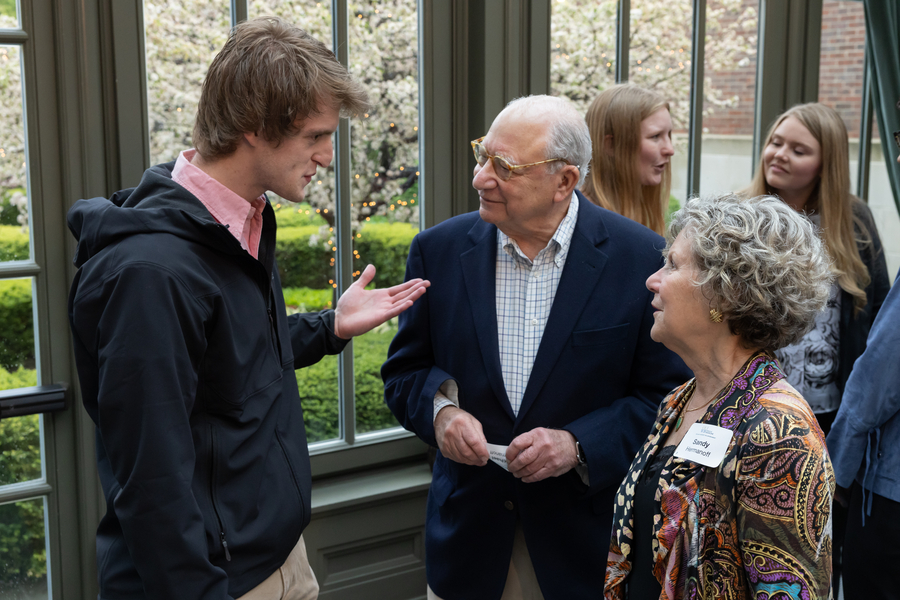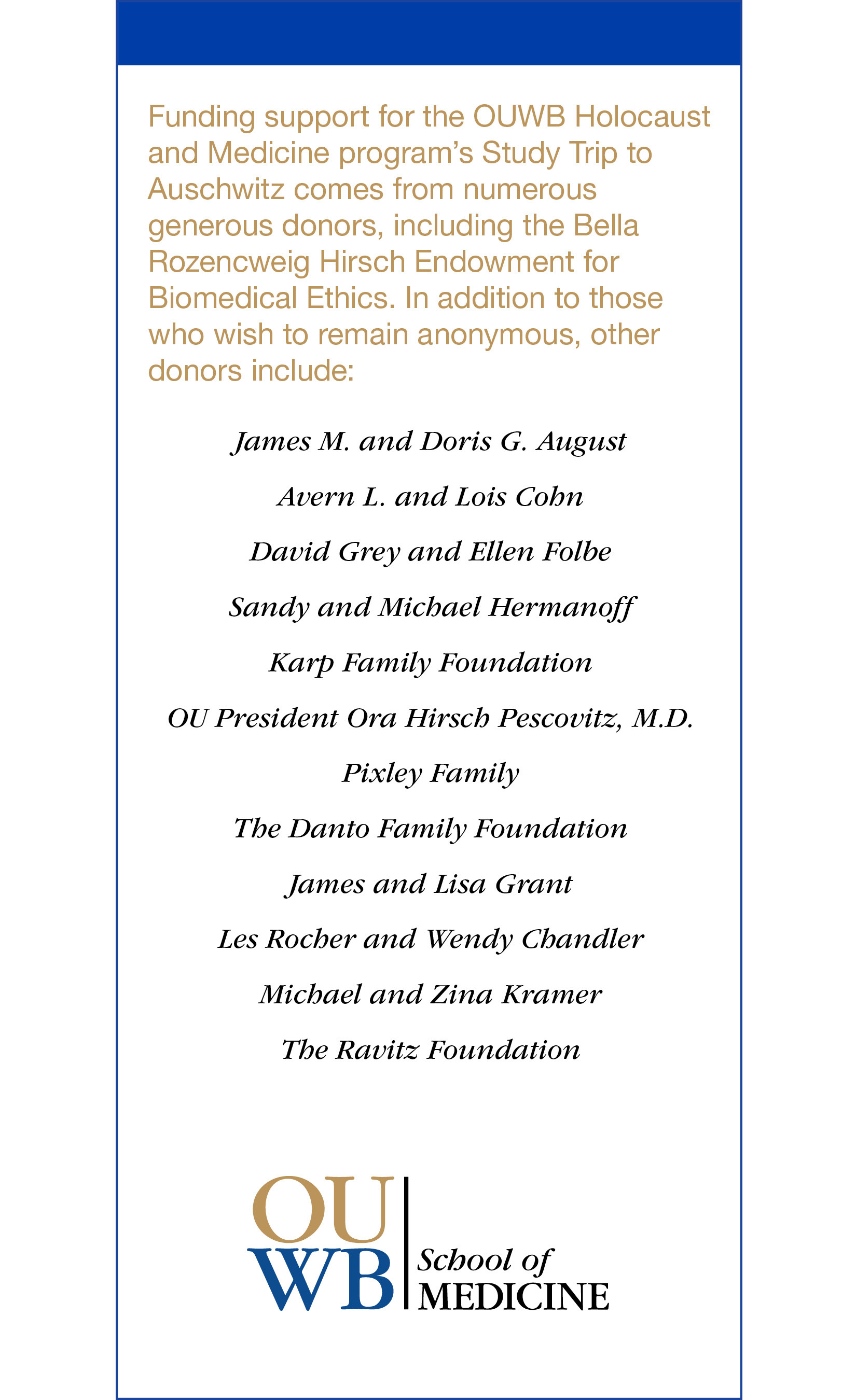
When Vern Pixley talks about “the most impactful” occurrences in his life, he points to two events: the birth of his children and visiting a concentration camp in Germany.
Pixley, president of Rochester-based Pixley Funeral Home, is among those making it possible for a group of students from Oakland University William Beaumont School of Medicine to now have a learning experience similar to his in Europe.
That’s because Pixley is one of more than a dozen other individuals, couples, and endowment funds — including the Bella Rozencweig Hirsch Endowment for Biomedical Ethics — to support OUWB’s Holocaust and Medicine program.
| Click here to visit the webpage dedicated to OUWB's Holocaust and Medicine program |
The program includes a study trip to Auschwitz, a first-of-its-kind experience for a U.S.-based medical school. A group of 20 OUWB students leaves June 13 for Poland.
Claus Weimann, director, Philanthropy at OUWB, said “it’s fair to say that the students would not be able to go on this trip if it weren’t for the donor-funded scholarships.”
On May 18, a special “send-off” dinner event was held to connect the donors and students benefitting from their generosity.
Pixley attended and said he supports the program because of OUWB’s commitment to training compassionate physicians and because of his own experience of visiting a concentration camp when he was younger.
“My experience with Dachau had such a profound impact on me that, other than the birth of my children, it’s probably the most impactful thing I’ve ever done,” said Pixley.
“I think students will bring back a deeper understanding of so many things, especially given some of the events that are happening in the world at the time of the trip. They are going to have an incredible experience.”
Duane Mezwa, M.D., Stephan Sharf Dean, OUWB, told donors like Pixley how grateful he is for their support.
“Bringing this program to fruition took a lot of work and many people made it possible, especially our donors,” he said. “Thank you for funding this program so that we could further develop humanism and medicine at OUWB. It is the core of who we are and why we are a different medical school — and you’re helping us attain that reputation.”
‘So very proud’

During the send-off dinner, Oakland University President Ora Hirsch Pescovitz, M.D., also spoke to everyone involved with bringing the program to life. She expressed gratitude to the donors for making the Poland trip possible.
“This program is one that makes me so very proud to be associated with Oakland University, OUWB, and Beaumont,” she said. “It really is one of the programs that differentiates us from essentially every other medical school in the country.”
The curriculum for the OUWB Holocaust and Medicine program includes pre- and post-trip educational sessions, as well as intensive focus on student reflection about ethics, humanism, and professional identity formation. Participants will engage in a seven-week seminar when they return and share what they learn throughout the community. They also will help teach other students who aren’t going to Poland.
Since finding out they were accepted into the program in February, students have been preparing via asynchronous modules prepared by the program directors: Jason Wasserman, Ph.D., and Hedy Wald, Ph.D. The group also visited The Zekelman Holocaust Center in Farmington Hills.
At the May 18 event, Pescovitz explained how the idea for OUWB to have a study trip to Auschwitz originated with a conversation between her, Wasserman, and Wald. The conversation took place after Wald delivered the keynote address at the 2020 Faircloth Evening of Medical Humanism.
She also explained she supports the program because “there is so much to learn” and that she has personal connections with the Holocaust, having lost many family members to the atrocities that took place at concentration camps during World War II.
Pescovitz urged the students to learn in a way that will allow them to share the experience with others, and to be aware of why OUWB is leading the way.
“You are in a school where kindness, compassion, and ethics are primary,” she said. “The reason we have created this program is to help instill those basic principles in you.”
‘I had to be part of it’
Weimann said donors have expressed three primary motivating factors for supporting the program.
“Number one, they want to help work against the idea that anyone might forget the Holocaust,” he said. “They also want to help shape 21st-century physicians who will use this experience to make compassionate and kind decisions in the future, and they make personal connections with the students they support.”
Several donors in attendance at the May 18 event offered additional insight into their support for the program.
| More from OUWB |
Destination Poland: Students to study abroad via OUWB Holocaust and Medicine program Med students visit local Holocaust center, continue prep for OUWB Study Trip to Auschwitz |
James and Doris August were among them.
James August said his father was a psychoanalyst who treated many survivors after the war. August said supporting the OUWB program is a way of honoring his father.
He said he’s hopeful the experience will help students realize the importance of compassion.
“Young people going into medicine need to understand that they’re treating the patient, and not the disease — no matter what the issue is,” he said.
August said he also hopes students realize the resilience of human beings after they experience trauma and that “it is possible to go forward.”
Michael and Sandy Hermanoff also helped fund the program.
Michael Hermanoff said he knew many people who were survivors. He recalls being shown films of the liberation in 1946 and having recurring nightmares as a result.
In light of current world events, he’s hopeful that students gain better understanding of how humans can treat each other.
“Unfortunately, these kinds of events are not unique and have affected many segments of the world’s population,” he said. “It’s part of, for lack of a better expression, the human experience.”
David Grey, M.D., a Beaumont ophthalmologist and assistant professor, Department of Ophthalmology, OUWB, is a donor who is going on the trip. Jonathan Grey, his son who is an OUWB student, also is going.
David Grey said when he first heard about the program, he knew “it was something that we want to be part of.” Among many things pertaining to the trip, Grey said he is particularly interested with the aspects that deal with physician identity.
“What made the German physicians do what they did, how did the Jewish physicians react? It’s another big segment of learning,” he said. “When I heard about this opportunity…I had to be part of it.”
For more information, contact Andrew Dietderich, marketing writer, OUWB, at [email protected].
To request an interview, visit the OUWB Communications & Marketing webpage.
NOTICE: Except where otherwise noted, all articles are published under a Creative Commons Attribution 3.0 license. You are free to copy, distribute, adapt, transmit, or make commercial use of this work as long as you attribute Oakland University William Beaumont School of Medicine as the original creator and include a link to this article.

